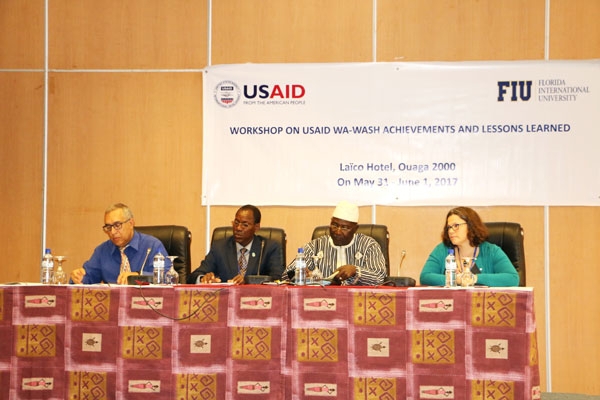The USAID WA-WASH Program has improved the living conditions of over one million people in Niger, Ghana and Burkina Faso
Implemented in 2011 in three West African countries - Ghana, Niger and Burkina Faso - the USAID West Africa WASH program, headquartered in Burkina Faso, is nearing completion at the end of 2017. Its field of intervention covers Water, Hygiene, Sanitation, Climate Change, Food Security and Environment sectors. In order to present the achievements made during the program’s implementation aiming to improve conditions for WASH service access among populations in the region, the Regional Director of USAID WA-WASH program, Lakhdar BOUKERROU, organised a workshop on capitalising on the achievements of the WA-WASH program on June 1, 2017 in Ouagadougou, Burkina Faso. Through papers, presentations and projections, the workshop participants were able to discover the program’s achievements by area of activity and geographical zone.
Thanks to the USAID WA-WASH program, over 65,000 people in Ghana, Niger and Burkina Faso have been able to access drinking water estimated at more than 132 million litres, and more than 62,000 people have improved sanitation conditions through the construction of 8,192 toilets. The program has also facilitated the installation of more than 5,800 water points for hand washing with all necessary equipment. Through this program, nearly 10,000 farmers have benefited from better tools and technologies to increase their productivity and improve their resilience to the effects of climate change.
The WA-WASH program, implemented with the support of the Florida International University (FIU), is carried out in two phases. In Phase I (2011-2015), the USAID WA-WASH program worked on innovative implementation approaches to improve sustainable access to drinking water services, adequate sanitation, and food safety. Adaptation to climate change, gender mainstreaming and knowledge management were also themes developed in this phase.
During Phase II (2015-2017), USAID WA-WASH directly supported the USAID Water Strategy while enabling Phase I beneficiaries to serve as trainers and promoters of lessons learned and techniques acquired for the benefit of their grassroots community.
After this workshop, representatives of the African Water Association (AfWA), the USAID WA-WASH office, the Centre of Economic and Social Studies and Experiments in Western Africa, and the ECOWAS Regional Coordination Centre met at the head office of the WA-WASH program. This meeting aimed to enable these organisations to learn from one another and share their experiences. On this occasion, AfWA’s Executive Director, Sylvain USHER, briefed the participants on the history, missions and programs implemented by AfWA, as well as its expertise in regional program management in the field of water, sanitation and climate change, specifically the AfriCap, RASOP and AfriAlliance programs.

 English
English  Français
Français 
